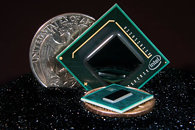Monday, December 26th 2011

Intel Readies Atom-based SoC for NAS Devices
Intel is planning to launch a new system-on-chip (SoC) processor derived from Atom, for network-attached storage (NAS) devices. NAS devices simple computers that connect hard drives directly to the network, where they are accessed by other computers. Over the years, NAS devices have added several functions, such as the ability to expand storage from external storage devices, the ability to perform simple tasks such as bit-torrent downloads, etc. To keep up with the growing need for compute power with these "super-NAS" devices, and to keep power draws low, there is a demand for low-power, low-footprint (small in size), and high-performance processing cores. This is one small but emerging segment that Intel doesn't want to concede to high-end multi-core ARM processors.
Sources told DigiTimes that Intel is working on an entire lineup of Atom processors for NAS devices, targeting various performance and power-draw segments. Intel is codenaming these Atom processors "Centerton". The chips are built on second-generation Atom architecture, and will be built on the 32 nm process. In related news, Intel also plans to roll out 22nm Silvermont-based Atom processors in 2013 and 14nm Airmont-based Atom parts in 2014, according to sources.
Source:
DigiTimes
Sources told DigiTimes that Intel is working on an entire lineup of Atom processors for NAS devices, targeting various performance and power-draw segments. Intel is codenaming these Atom processors "Centerton". The chips are built on second-generation Atom architecture, and will be built on the 32 nm process. In related news, Intel also plans to roll out 22nm Silvermont-based Atom processors in 2013 and 14nm Airmont-based Atom parts in 2014, according to sources.

7 Comments on Intel Readies Atom-based SoC for NAS Devices
atom is low power but its performance is low too, maybe if intel push the performance a little it would be much better
If you thinking of buying a current day NAS and want/need fast RAID hardricve speed, think again as unless youre spening thousands they will all be slow... the solutuion is to get one of these: HP ProLiant Turion II N40L MicroServer - £100.. | ...
Its got cashback offer so costs next to nothing and youd be hard pressed to build a server for cheaper ;)